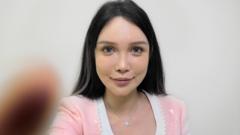Abby Wu's journey into the world of cosmetic surgery began at merely 14 years old, fueled by a traumatic change in her appearance after medical treatment led her to gain significant weight. This pivotal moment propelled her into the realm of aesthetic procedures, beginning with liposuction. Today, a now 35-year-old Abby has undergone more than 100 cosmetic surgeries, collectively costing her around half a million dollars. Owning a beauty clinic in central Beijing, she stands as a prominent figure within China's surging plastic surgery industry, which has soared to unprecedented heights in recent decades.
Initially stigmatized, cosmetic surgery has gained immense traction in China, especially among young women, with statistics showing that 80% of surgery recipients are female, primarily around the age of 25. The fascination with altering one's looks often intertwines with social media culture, creating both beauty standards influenced by Western notions along with trending Korean and anime aesthetics.
However, as Abby recounts her personal experience, she also reveals the harsh truth behind the glittering facade of cosmetic procedures. Many women, driven to mirror the virtually flawless images portrayed online, often find themselves in pursuit of bizarre and unrealistic beauty ideals. Dangerous practices like injecting Botox behind ears to create a doll-like appearance have surfaced, leading to grotesque results when mirrored against real life.
The alarming presence of unlicensed cosmetic clinics has emerged as a significant concern, with countless practitioners operating illegally across the country. Reports have indicated that approximately 80,000 establishments lacked the proper licensing up until 2019, resulting in an overwhelming number of complications, with patients often seeking corrective surgeries due to botched operations.
The issue is further complicated by societal pressures regarding looks. A disturbing new trend sees vulnerable young women coerced into taking on debt to finance their surgeries under the guise of employment opportunities in the beauty sector. Scams operate where job offers are linked to mandatory cosmetic procedures, effectively entrapping candidates in a cycle of debt and disappointment.
Behind Abby's candid portrayal of her transformation journey lies a sobering reality that many have faced. Like her, others have fallen victim to unqualified services and unethical clinics, leading to irreversible consequences. Yet, she remains resolute about her pursuit of beauty, adamant that her operations have granted her a level of confidence and satisfaction that continues to fuel her endeavors.
Ultimately, while the pursuit of beauty thrives in China, the profound risks associated with this booming industry serve as a stark reminder of the complexities surrounding cosmetic enhancement. As young women navigate societal pressures to conform to strict beauty standards, it's crucial to confront the realities they face in this rapidly evolving landscape.
Initially stigmatized, cosmetic surgery has gained immense traction in China, especially among young women, with statistics showing that 80% of surgery recipients are female, primarily around the age of 25. The fascination with altering one's looks often intertwines with social media culture, creating both beauty standards influenced by Western notions along with trending Korean and anime aesthetics.
However, as Abby recounts her personal experience, she also reveals the harsh truth behind the glittering facade of cosmetic procedures. Many women, driven to mirror the virtually flawless images portrayed online, often find themselves in pursuit of bizarre and unrealistic beauty ideals. Dangerous practices like injecting Botox behind ears to create a doll-like appearance have surfaced, leading to grotesque results when mirrored against real life.
The alarming presence of unlicensed cosmetic clinics has emerged as a significant concern, with countless practitioners operating illegally across the country. Reports have indicated that approximately 80,000 establishments lacked the proper licensing up until 2019, resulting in an overwhelming number of complications, with patients often seeking corrective surgeries due to botched operations.
The issue is further complicated by societal pressures regarding looks. A disturbing new trend sees vulnerable young women coerced into taking on debt to finance their surgeries under the guise of employment opportunities in the beauty sector. Scams operate where job offers are linked to mandatory cosmetic procedures, effectively entrapping candidates in a cycle of debt and disappointment.
Behind Abby's candid portrayal of her transformation journey lies a sobering reality that many have faced. Like her, others have fallen victim to unqualified services and unethical clinics, leading to irreversible consequences. Yet, she remains resolute about her pursuit of beauty, adamant that her operations have granted her a level of confidence and satisfaction that continues to fuel her endeavors.
Ultimately, while the pursuit of beauty thrives in China, the profound risks associated with this booming industry serve as a stark reminder of the complexities surrounding cosmetic enhancement. As young women navigate societal pressures to conform to strict beauty standards, it's crucial to confront the realities they face in this rapidly evolving landscape.



















